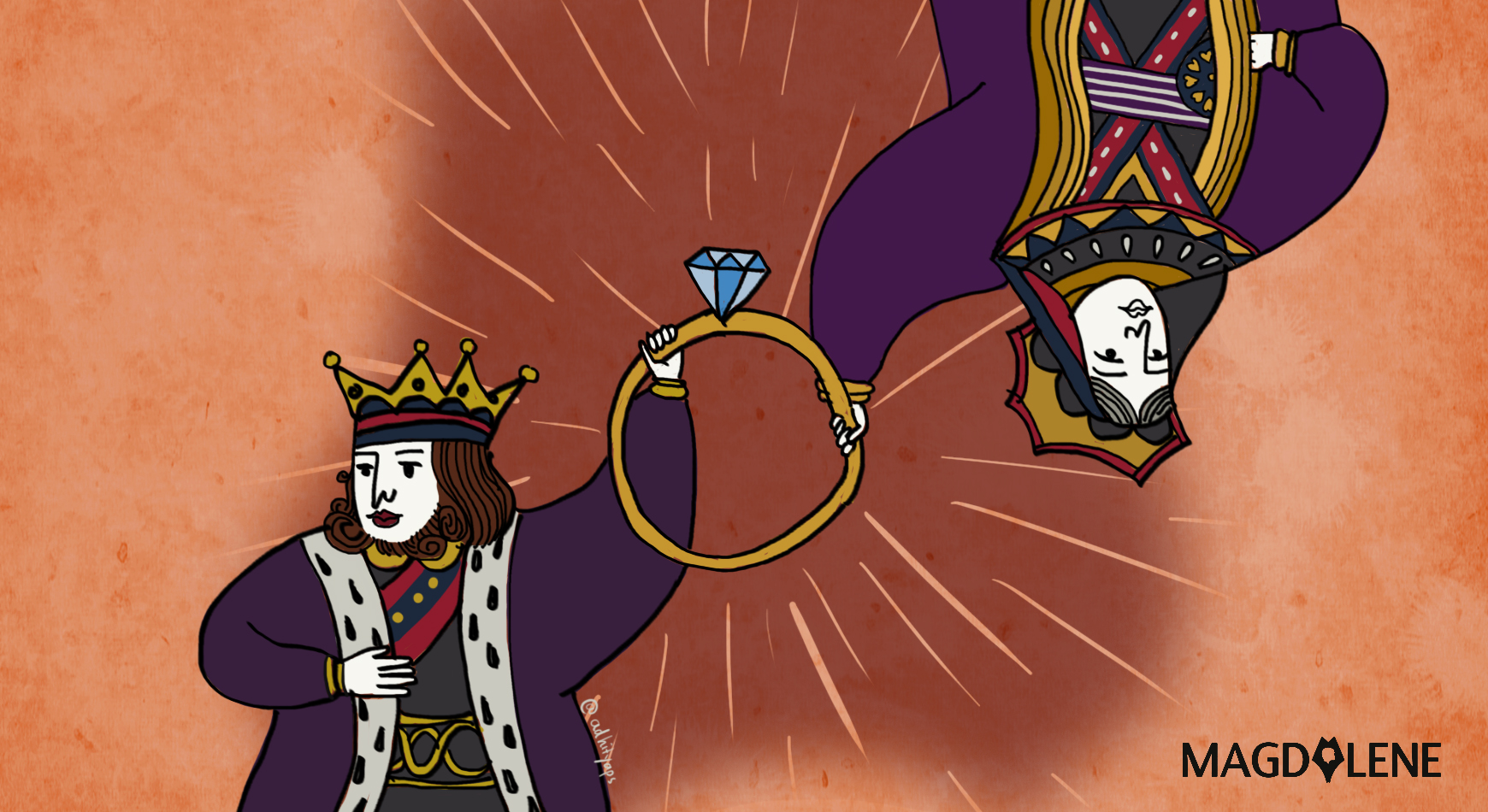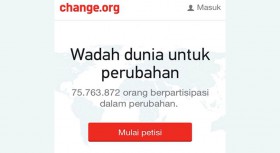Earlier this month, news about a wedding that took place in Karangendah Village, Ogan Komering Ulu (OKU), South Sumatra, between a 16 year old boy named Selamet Riyadi and a 71-year-old woman named Rohaya went viral. Social media and online news outlets were flooded with pictures and a video of Selamet taking oath before a local clergy to officiate his relationship with Rohaya as husband and wife.
The wedding was unregistered, locally known as nikah siri, which, although not formally acknowledged by the state, is considered valid under Islamic law. Later on, the couple was invited to the talk show Hitam Putih, known for its bluntly speaking host Dedy Corbusier, where they were asked to spill some beans on their rather unusual courtship. Before the camera, again and again Rohaya and Selamet defended their professed love for each other, greeted by laughter and giggle from the audience.
As the overly exposed marriage between Rohaya and Selamet continued to fill in people’s news feeds and trending topics in the past weeks, facts about the couple’s new married life started to emerge.
It is unclear whether Selamet is currently still in school, but the interview in Hitam Putih reveals that now Selamet has taken up the role as the financial provider of the household by doing menial jobs for people in the village. When he goes off to work, Rohaya stays at home and takes care of the house. Out of jealousy, Selamet would often lock Rohaya up in the house when he is away, because he is worried Rohaya would wander around with another man.
Selamet also does not seem to understand the concept of procreation, as he eagerly boasts to the audience that he wants to have children with Rohaya. Something that triggered another collective giggle by the audience.
This is child marriage, his gender irrelevant
From the way the media and the public reacted to the news, one thing is clear: they all seemed to think it’s funny for a boy like Selamet to be in love with an elderly woman such as Rohaya. Nobody seemed to mind, let alone find the matter odd and disturbing. It is as if we intentionally disregard the fact that the boy is only 16 years old, three years shy from the legally allowed age for men to be married, according to Indonesian Marriage Law No. 1/1974. This makes him an under-age minor by the law and therefore the marriage hereof should be automatically regarded as a child marriage. There were no voices of resentment from the authority, including the Indonesian Child Protection Commission (Komisi Perlindungan Anak Indonesia/KPAI), when in fact child marriage has been long regarded as a serious threat to the fulfillment of child rights.
People’s reaction is exactly the opposite when a similar child marriage case emerged back in 2008. At the time, Syekh Puji, a wealthy businessman from Semarang, was brought in for questioning by the authority and sentenced to four years in jail and a Rp 60 million fine for marrying a 12 year old girl. His act was proven felony against the Law on Child Protection.
What is it that gets us all fired up when an adult man marries a little girl, but keeps us chill as a cucumber in a cold winter when an adult woman marries a little boy? Why do we think it’s creepy for a grown up man to be lurking at a little girl, but find an adult woman lusting over a boy as merely a joke? They both after all are fine examples of child marriage and statutory rape. Both of which in countries such as the US and UK are considered crime and punishable by law.
The double standard may be linked with the patriarchal values that are rooted in many societies, including Indonesia. Women are seen as weak, helpless and emotional beings that make them vulnerable to harm and pain, while men are typically strong and assertive. This dichotomy of femininity and masculinity has led to a general assumption that men are independent and therefore can take care of themselves, even when they are in a difficult situation or trapped in an abusive relationship.
While it is true that the majority of child marriages involve girls, boys can be victims too. Recent data from UNICEF shows that 18 percent of those married before age 18 are boys, and 82 percent are girls. Because he is a boy, the public may see Selamet as an independent being who can choose not to marry Rohaya and leave her whenever he wants to. However, the fact that he is still a child makes it hard for him to make informed decisions, and therefore he is vulnerable to manipulative actions asserted by adults.
Selamet, in this case, is as vulnerable as the 12-year-old girl that was married off to Syekh Puji nine years ago. Still, we chose to shrug off our shoulders and laugh it off instead.
Child marriage violates child’s rights
Selamet now has to earn every penny he can get to provide for his wife. A boy his age in Indonesia is normally an 11th grader struggling his way to finish middle school. They should be worrying about final exams and prep schools instead of paychecks and overdue bills. Many victims of child marriage are denied their rights to education and skills development which, ultimately, puts an end to the possibility for them to be able to live a healthy and fulfilling live and to contribute fully to their families and communities.
We may not immediately realize this but we adults who sit at the front row of the audience bench and laugh the loudest when reading up on Selamet and Rohaya’s wedding are also responsible for normalizing child marriage while, at the same time, robbing Selamet of his childhood and his every chance to live a fulfilling life.
Still think it’s haha funny?
Child marriages are prone to domestic violence
As a child, by default Selamet is a victim. But he may not be the only one here. Locking Rohaya up in the house because she is not allowed to hang out with other men in the village is a sign of abusive relationship. Domestic violence is dangerous and could seriously bring fatal harm to the victims.
Studies have shown that child marriages are prone to domestic violence , be it physical, emotional or psychological. Chances are Selamet and many other teenagers are never given proper education and understanding of what a healthy and equitable relationship is. Indonesia has always been in limbo in deciding whether or not teenagers should be given access to proper sex education.
The strong patriarchal values, moreover, may put Selamet in a situation where he thinks he holds full power over his wife, because, you know, he is a man. He may think that controlling Rohaya is an expression of love, when, in fact, it is a form of violence. Putting a child who does not know squad in a situation where he is expected to be accountable for his actions in itself is a fallacy.
Finally, it is time we put an end to romanticizing child marriage. Child marriage is no joke. It is illegal, unlawful and should be treated as such, no matter who the victim is – a girl or a boy. No exception. The government and society as a whole have the responsibility to ensure every child is protected for their best interests and is not forced into a situation where they are denied their rights.
It is also a perfect time for us to revisit our constant (ab)use of nikah siri. Let us, for a moment, think back how we have been misguided in exercising the leniency in Islam to practice this type of marriage. If we continue misusing it for the sake of justifying child marriage or abusive polygamous relationship, then the joke is on us, really.







Comments